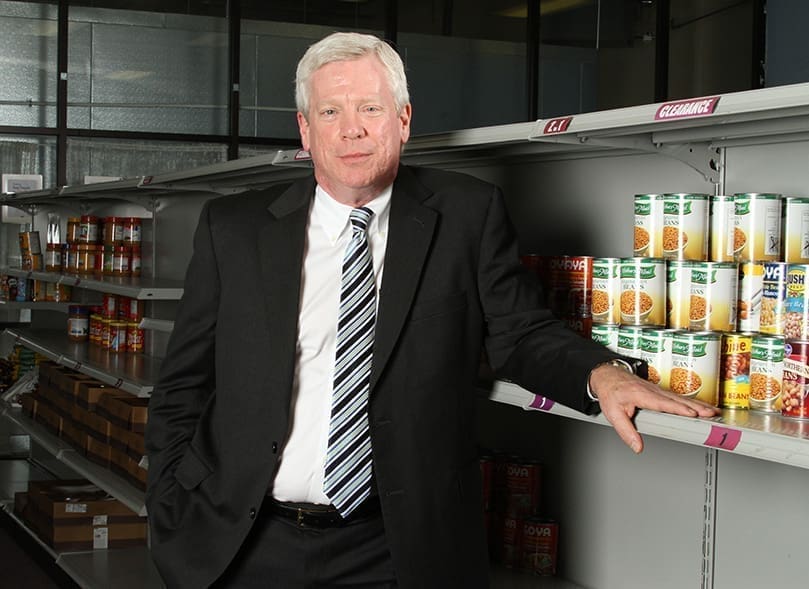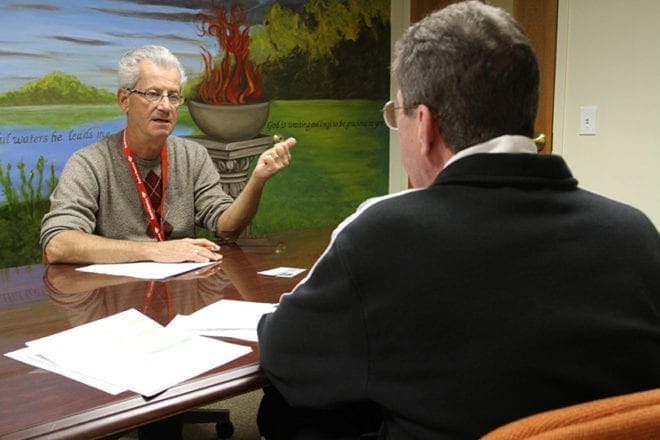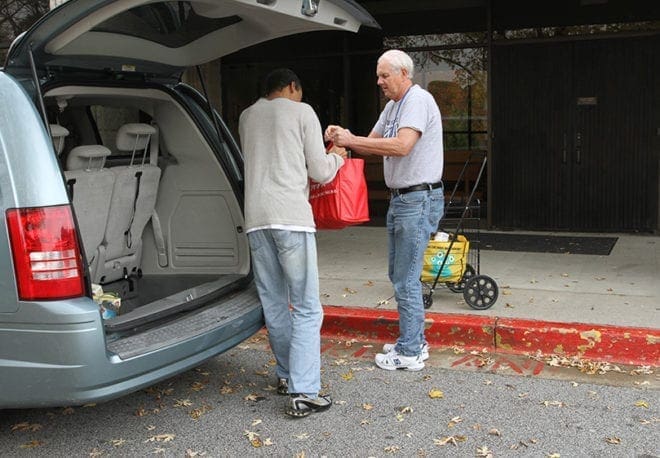 Photo By Michael Alexander
Photo By Michael Alexander
Atlanta
SVdP Provides Care To Growing Numbers
By ANDREW NELSON, Staff Writer | Published December 8, 2011
Nearly one out of every five Georgia residents now lives in poverty. Figures from the U.S. Census Bureau show some 1.83 million people in Georgia living below the poverty line, some 18.7 percent of the state. It is the highest level since 1993.
Volunteers at the St. Vincent de Paul Society see their faces, people who struggle to keep a roof over their head, the heat on as temperatures dip, and a car on the road to make it to their job, if they have one.
John Pepe, a longtime volunteer, said, “People you would never believe would be at our door” fill the waiting area. People have no savings and retirement accounts were tapped in the hope that a new job was around the corner, he said.
Volunteers with St. Vincent de Paul at Holy Family Church, Marietta, are seeing more people looking for aid. In response, the ministry changed its guidelines to make it a priority to stretch the aid budget.
“That could’ve been me, just like it could’ve been anyone else,” he said.
Leaders with the archdiocesan-wide St. Vincent de Paul Atlanta fear the economic downturn will affect children and families for years. Young people in school who had to move after losing their home or who watched their parents deal with job loss may not have the education opportunities or may suffer emotional issues that will hurt their futures.
“We are going to be able to look back 10 or 15 years from now and say that started now. That’s how these cycles (of poverty) are created,” said John Berry, CEO of St. Vincent de Paul Atlanta.

John Pepe helps a Marietta resident who came in for assistance with his electric bill last month. Pepe has worked with St. Vincent de Paul at Holy Family Church, Marietta, for nine years. Photo By Michael Alexander
From what Pepe sees, many more people are living paycheck to paycheck, worrying about unanticipated bills, like a car breaking down.
“If anything goes wrong, they are going to be upside down,” he said.
With assistance from the charity, Kimberlie Young, a registered nurse and a coach for her son’s soccer team of 5-year-olds, has been able to keep her family better fed and settle unpaid rent.
“It’s such a relief we are not behind in rent,” said Young. “I’ve learned how to use my crockpot in whole new ways.”
The past 18 months has seen the family of four take a step toward financial stability only to then confront setbacks, from her holding a $35-an-hour job to a series of miscommunications that left her family without health insurance and paying nearly $300 a month for her child’s prescription medicine. She asked her doctor for free samples to stretch the medicine.
“You just feel like you are never going to get out of the rut. It’s been so humbling. The past year and a half has been crazy. But God continues to provide. St. Vincent de Paul has been the blessing of the year,” said Young, who spoke on a recent morning after working back-to-back 13-hour shifts at a regional hospital.
Young and her husband, Andrew, who now works at a local factory, and their two children have relied on the charity to bridge the financial gaps. They live in east Cobb County, renting in a comfortable subdivision.
“It’s gotten down to when we had $38,” said Young, who is 26, adding even though she has a good work history and good references, finding a full-time job has been a challenge.
Government figures show 5.7 million people have been out of work for 27 weeks or longer. The most recent unemployment rate dropped to 8.6 percent, with 13 million people looking for work. Caroline McCoy-Hansen, the leader of Holy Spirit Career Ministry, said her ministry at Holy Spirit Parish serves everyone from top-of-the-ladder executives and IT experts to lawyers and business owners whose companies have failed.
“Today’s unemployed, at least those I serve, are at a higher level of experience and education than in the past. They range from age 35 to 60 plus. Ten years ago, the more typical unemployed person was at a lower level of education and experience,” she said in an email.
It’s an ecumenical ministry, driven by faith, she said.

In the waiting area at Holy Family Church, Marietta, is a box that was built and donated by a parishioner, where food donations can be dropped off. Photo By Michael Alexander
“We all know and remind one another of the importance of God in our plans. We find God in everything, and in this ministry, we find God in one other,” she said.
Government figures show that Georgia’s poverty rate was the third highest in the country in 2010. The poverty rate for a family of four is living on an income of less than $22,314 and for a single person, $11,139.
Stretching The Aid Budget To Help More People
At Holy Family Church, the volunteers helped 2,229 people in the most recent fiscal year. That is an 87 percent increase, Pepe said.
The experience of the Marietta program is mirrored throughout the 70 parish conferences affiliated with St. Vincent de Paul Atlanta.
In 2010, the central office of the charity, based in Chamblee, reported helping close to 190,000 people in the Archdiocese of Atlanta, a jump of more than 10,000 people in one year, according to its most recent annual report.
More people turned to its thrift stores. The annual report from the central office shows that in 2010 the equivalent cash value of clothing, food and other items was $1.4 million versus $1.26 million in 2009.
And the new people asking for help raised different questions. Volunteers faced decisions whether to pay mortgage payments for the first time, Berry said. The newcomers “went from a two-income home to a one-income or no income,” he said.
The increased demand for services is straining programs because the fundraising is not keeping up.
In the monthly collection at Holy Family Church, parishioners have given more—some 13 percent more—but the increased aid requests forced the volunteers to revise an old policy. In the past, the goal was to be generous with people who qualify for aid, Pepe said. Now the goal is to stretch the monthly collection farther, by giving less money to more people, Pepe said.
“Today’s model is a lot different,” he said.
With the Youngs, Pepe reached out to the landlord to ask for relief from the bills, along with negotiating with the utility company to defer payment.

St. Vincent de Paul volunteer Jim Hoene, right, provides some food to someone in need. Photo By Michael Alexander
For Berry, a goal has been simply to “decrease the slope of decline” in donations.
In the past, one generous donor used to give $25,000 four times a year, but as the economy softened, the gift was trimmed back to twice a year. So far, Berry said, the financial support from this major contributor has not shown up.
In the 2010 annual report, the charity reported spending $8.8 million on services for the poor.
“We look a lot closer with a magnifying glass” at expenses, Berry said. The central office trimmed administrative costs by more than $100,000 and had to lay off staff in a cost-saving measure.
St. Vincent de Paul Atlanta is taking advantage of new opportunities to serve people by partnering with groups like Kroger grocery stores to distribute free perishable food, the Atlanta Center for Self Sufficiency to offer transitional jobs to build a person’s work history, and the Atlanta Prosperity Campaign to ensure people are getting all the benefits available to them.
The agency is relying on small donations of $25 and $30 to make up the difference, he said. “That’s been what’s saved us. If we just relied on the big donations, we’d be in trouble,” he said.
Berry also said the Catholic community needs to be a strong advocate with lawmakers for laws that lower hurdles for people struggling to climb out of poverty.
“We sometimes keep our light under the bushel basket too much,” he said. “Georgia does not have a great reputation for the support for social needs.”

